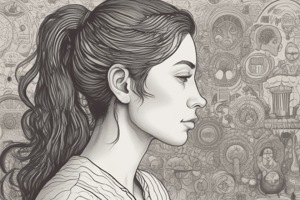Podcast
Questions and Answers
What is one of the primary uses of the DSM-5 in psychiatry?
What is one of the primary uses of the DSM-5 in psychiatry?
- To prescribe medication
- To diagnose mental disorders (correct)
- To conduct risk assessments
- To create treatment plans for patients
Which of the following treatments involves medication for mental health issues?
Which of the following treatments involves medication for mental health issues?
- Cognitive Behavioral Therapy (CBT)
- Psychodynamic therapy
- Mood stabilizers (correct)
- Dialectical Behavior Therapy (DBT)
In which branch of psychiatry would you primarily address mental health issues in elderly patients?
In which branch of psychiatry would you primarily address mental health issues in elderly patients?
- Forensic Psychiatry
- Geriatric Psychiatry (correct)
- Adult Psychiatry
- Child and Adolescent Psychiatry
What does a comprehensive psychiatric evaluation typically not include?
What does a comprehensive psychiatric evaluation typically not include?
Which of the following is a current trend in the field of psychiatry?
Which of the following is a current trend in the field of psychiatry?
Flashcards are hidden until you start studying
Study Notes
Definition
- Related to the diagnosis, treatment, and prevention of mental disorders.
Key Areas in Psychiatry
-
Diagnosis
- Utilizes DSM-5 (Diagnostic and Statistical Manual of Mental Disorders) criteria.
- Includes clinical interviews, psychological testing, and observations.
-
Treatment Modalities
- Psychotherapy: Talk therapy aimed at resolving emotional and psychological issues.
- Types: Cognitive Behavioral Therapy (CBT), Dialectical Behavior Therapy (DBT), Psychodynamic therapy.
- Medication: Psychiatric drugs including:
- Antidepressants (e.g., SSRIs, SNRIs)
- Antipsychotics (e.g., atypical and typical)
- Mood stabilizers (e.g., lithium).
- Combination Therapy: Integration of both psychotherapy and medication.
- Psychotherapy: Talk therapy aimed at resolving emotional and psychological issues.
-
Branches of Psychiatry
- Adult Psychiatry: Focuses on mental health issues in adults.
- Child and Adolescent Psychiatry: Addresses mental health in younger populations.
- Geriatric Psychiatry: Focuses on mental health issues in elderly patients.
- Forensic Psychiatry: Intersection of mental health and law.
Common Mental Disorders
- Depression and Mood Disorders
- Anxiety Disorders
- Bipolar Disorder
- Schizophrenia
- Personality Disorders
Psychiatric Evaluation
- Comprehensive assessment including:
- Mental status examination (MSE)
- History taking (medical, psychiatric, family)
- Risk assessment (suicidal/homicidal ideation).
Ethical Considerations
- Informed consent
- Confidentiality
- Cultural competence
- Professional boundaries.
Current Trends
- Increased focus on telepsychiatry and digital mental health tools.
- Emphasis on holistic and integrative approaches.
- Awareness of mental health stigma and advocacy for access to care.
Psychiatry Overview
- Psychiatry focuses on the diagnosis, treatment, and prevention of mental disorders.
- The Diagnostic and Statistical Manual of Mental Disorders, 5th Edition (DSM-5) is used for standardized diagnosis.
- Assessment methods include clinical interviews, psychological testing, and observations.
Treatment Approaches
- Psychotherapy involves talk therapy to address emotional and psychological issues.
- CBT, DBT, and psychodynamic therapy are examples of different psychotherapy approaches.
- Medication is often used in conjunction with psychotherapy, with categories including antidepressants, antipsychotics, and mood stabilizers.
Branches of Psychiatry
- Adult psychiatry addresses mental health issues in adults.
- Child and Adolescent Psychiatry focuses on mental health in younger populations.
- Geriatric psychiatry addresses mental health issues in elderly patients.
- Forensic psychiatry combines mental health and legal aspects.
Common Mental Disorders
- Examples of common mental disorders include:
- Depression and Mood Disorders
- Anxiety Disorders
- Bipolar Disorder
- Schizophrenia
- Personality Disorders
Psychiatric Evaluation
- Comprehensive assessment includes:
- Mental status examination (MSE)
- Medical, psychiatric, and family history taking
- Risk assessment for suicidal or homicidal ideation
Ethical Considerations
- Ethical considerations include informed consent, confidentiality, cultural competence, and maintaining professional boundaries.
Current Trends
- Increased focus on telepsychiatry and digital mental health tools.
- Emphasis on holistic and integrative approaches to treatment.
- Growing awareness of mental health stigma and advocacy for greater access to care.
Studying That Suits You
Use AI to generate personalized quizzes and flashcards to suit your learning preferences.




